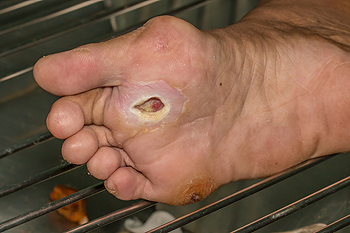 It is beneficial for wounds on the feet to be promptly treated. They may occur from stepping on a piece of glass or a sharp object. Patients who are diabetic may endure wounds on the feet, and this may be a result of a condition known as neuropathy that often accompanies diabetes. This condition affects the ability to feel if there are wounds, bruises, or cuts, which may cause them to easily become infected. Minor wounds may be treated by washing and drying the affected area thoroughly, followed by applying a clean bandage over the wound. Severe wounds on the feet may need medical attention, and it is strongly suggested that you seek the counsel of a podiatrist who can guide you toward proper treatment.
It is beneficial for wounds on the feet to be promptly treated. They may occur from stepping on a piece of glass or a sharp object. Patients who are diabetic may endure wounds on the feet, and this may be a result of a condition known as neuropathy that often accompanies diabetes. This condition affects the ability to feel if there are wounds, bruises, or cuts, which may cause them to easily become infected. Minor wounds may be treated by washing and drying the affected area thoroughly, followed by applying a clean bandage over the wound. Severe wounds on the feet may need medical attention, and it is strongly suggested that you seek the counsel of a podiatrist who can guide you toward proper treatment.
Wound care is an important part in dealing with diabetes. If you have diabetes and a foot wound or would like more information about wound care for diabetics, consult with Donald Manger, DPM from Associated Podiatric Physicians, PA. Our doctor will assess your condition and provide you with quality foot and ankle treatment.
What Is Wound Care?
Wound care is the practice of taking proper care of a wound. This can range from the smallest to the largest of wounds. While everyone can benefit from proper wound care, it is much more important for diabetics. Diabetics often suffer from poor blood circulation which causes wounds to heal much slower than they would in a non-diabetic.
What Is the Importance of Wound Care?
While it may not seem apparent with small ulcers on the foot, for diabetics, any size ulcer can become infected. Diabetics often also suffer from neuropathy, or nerve loss. This means they might not even feel when they have an ulcer on their foot. If the wound becomes severely infected, amputation may be necessary. Therefore, it is of the upmost importance to properly care for any and all foot wounds.
How to Care for Wounds
The best way to care for foot wounds is to prevent them. For diabetics, this means daily inspections of the feet for any signs of abnormalities or ulcers. It is also recommended to see a podiatrist several times a year for a foot inspection. If you do have an ulcer, run the wound under water to clear dirt from the wound; then apply antibiotic ointment to the wound and cover with a bandage. Bandages should be changed daily and keeping pressure off the wound is smart. It is advised to see a podiatrist, who can keep an eye on it.
If you have any questions, please feel free to contact our office located in Hamilton Township, NJ . We offer the newest diagnostic and treatment technologies for all your foot care needs.
